There are some key considerations in having a good asphalt driveway. These critical points include:
• adequate foundation;
• proper drainage;
• appropriate materials;
• good construction practices; and
• timely maintenance.
Don Siler, asphalt technology specialist for Marathon Petroleum Company (MPC), concurs. “Good materials, good practices, good workmanship and good site preparation make a good driveway,” he says. “Driveways must be properly designed and constructed,” he adds. “If the design procedure is wrong, then the driveway will be faulty.”

Adequate foundation
Preparing an adequate foundation includes having a solid subgrade and building a strong aggregate base.
A common problem is subgrade that is not properly stabilized, says Siler. “When there is wet, soggy clay present, you need to remove it or put down a good stone base.” He adds that the worst failures can be subdivision driveways.
“Bad preparation on driveways in some subdivisions will result in construction (truck) traffic ruining the driveway. Driveway pavements can get buckled by truck traffic.”
Buddy Prather of Prather Paving in Lexington, Kentucky, concurs. “Soft dirt is a real issue,” he says. “You have to get rid of the soft top-soil and get to something solid. Around new homes, around the sides of the house and around the garage, you get backfill that hasn’t been compacted. It’s soft dirt. You have to replace it with something solid.”
“Putting down a rock base before placing the hot mix is critical,” Prather says. “The size or thickness of the rock makes a difference. We use 2-inch (top-size) rock—as big as your fist. The 2-inch rock sinks into the subgrade and stabilizes the earth,” adds Prather.
Proper drainage
Another key point is proper drainage. Problems develop when water removal is not sufficient.
“You need to drain water away from the pavement — away from the edge of the pavement,” says Siler. He recommends using a French drain (a trench filled with gravel or rock with a pipe designed to redirect water) to get moisture away from the pavement below the pavement level.
“Drainage, drainage, drainage is what my Dad always says,” said Prather. “He ran the business before I did. You’ve got to have good drainage. You’ve got to have slope to your pavement so the water will run off. The water needs to run off to the side in a sheet.
“If you have good drainage, your pavement will last,” adds Prather. “Both good surface drainage and good subgrade drainage. The rock has to be laid right so it will allow the water to leach out. Don’t let the water gather in low places and bust-up the pavement. Big rock will let the water drain out. It acts like a French drain. And we use geotextile around the drainpipes.”
MPC’s Siler says there is a definite benefit from a gravel base because it allows the water to drain.
Appropriate materials
It is important to use the right asphalt mix. Unless they own their own hot mix plant, the driveway paving contractor may get “the-mix-of-the-day” from the local hot mix plant. This material may not be suited for driveways. Driveways are susceptible to brittleness caused by oxidation and weathering. Some mixing plants set aside one of their storage bins for private mix projects.
Opinions differ as to what makes the best driveway mix. In general, driveway mixes should be designed with more asphalt binder and less air voids than highway mixes. The aggregate structure is where opinions differ.
Many experts prefer that driveway surface mix have a finer gradation than highway mix. This gives a finer surface texture and smooth appearance. Siler prefers a mix composed of good angular aggregate with stone-on-stone contact (sometimes called aggregate interlock).
“It may not be the prettiest looking mix, but it is the most durable. Avoid sand and rounded particles. They don’t have the strength of angular particles, even though they make a pretty mix. Err on the side of the stronger mix,” advises Siler.
The choice of gradation depends on the loading and desired appearance. Finer gradings will shed more water and look more uniform. Stony mixes can carry heavier loads and require thicker placement depths for compactibility. Prather says that they always use a 2-inch compacted binder course (with larger top-size stone) on farm driveways because it can take heavier loads.
Good construction practices
“Good workmanship is important, so the driveway will last,” says Prather. “Compaction is critical, including the edges and joints in the pavement.
“You have to tamp the edges of the pavement,” adds Prather. “And make the seams (joints) look good — tight and good.”
Prather says they always use a tack coat on residential driveways. “It’s a binding agent. We use SS-1H (asphalt emulsion). It prevents the surface course from slipping. If the surface course slips, it probably wasn’t tacked properly.”
It’s important to avoid segregation of the mix because a segregated mix can lead to potholes and pavement failures.
Maintenance
Most experts agree that the quality of the paving job is what matters most to driveway performance — particularly using a mix that is appropriate for the job and achieving good compaction. But maintenance is important, too.
Recommended maintenance treatments include taking care of the drainage features and crack-sealing. Overall pavement sealing is a matter of choice and wear-and-tear.
Water is the enemy of pavements. Proper installation of drainage at the time of construction is important, but it is equally important to assure that the drainage continues to work. Water can soften the subgrade and/or undermine the pavement.
Crack-sealing is an important part of maintaining the driveway pavement. Water and foreign material can enter the pavement and cause damage, if the cracks are not sealed. Some owners do not like the appearance of sealed cracks.
“Crack-filling does maintain the driveway, but it doesn’t look good. That’s why we seal the whole driveway, after we fill the cracks. Filling the cracks does stop water penetration and prolongs the life of the driveway,” says Prather.
In addition to sealing the driveway for appearance purposes, sealing can be used to preserve the pavement. Fuel-resistant, polymer-modified asphalt sealers can guard against spills. Stony mixes or pavements with open textures benefit from sealing.
Conclusion
Following the recommendations above and always hiring a top-notch professional to do the job can achieve long-lasting, good-looking asphalt driveways.














